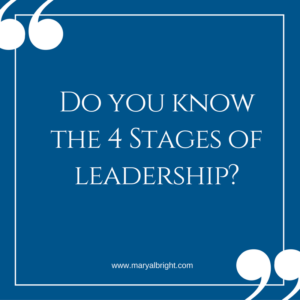
“That’s how a big corporation does things.So you need to deal with it.”
A few years ago, a small business owner uttered this phrase to a team member. The owner had goals. Big goals. Big dollar sign goals. And that owner felt that to play like the big boys with the big dollar signs, the company had to act “like big corporations do.”
I’ll be blunt here. Good leaders don’t say crap like that.
As I thought about it, I realized that small business owners need leadership development, mentoring and coaching. Most became entrepreneurs because they had an idea and not because they were skilled leaders. You can only grow an organization to a point before lack of leadership skills ends up being a bottleneck.
Master the skills of self-leadership so you can lead others more effectively.
Where are you in your leadership development? Check these 4 stages and some of the bullet point highlights. See if you can recognize where you might be and where you need to go.
Self-Leadership
How can you expect to lead others until you know how to lead yourself? When you master the skills of self-leadership:
- You discover your core values and your strengths.
- Build confidence to be a great team member and contributor
- Embrace personal responsibility.
- Soft skill development: Learn to be a learner. Accept that you’ll never know everything and will be a life long learner.
- Develop motivation to make a difference
- Develop motivation to mentor and lead others
Direct (Tactical) Leadership
- Ready to take on the responsibility for the success of others
- Takes the plan from strategic leadership and execute it, or manage it with the team
- Capable and confident to be that first level teacher and mentor
- Build your proficiency with public speaking and leading small groups
- Mentored by strategic leadership to develop plans
Indirect (Strategic) Leadership
- No longer directly in charge of the team, your plans affect how the team ultimately performs and develops
- Have bigger picture goals to manage from a strategic point of view.
- Mentor the direct leader to help her build planning skills
- Work with executive leadership to understand the long term goals and how your piece of the pie fits into the big picture
- Mentored by executive leadership to understand the expanse of the organization
Executive Leadership
- Your decisions impact all levels, internally and externally
- Focus is far-reaching and long-reaching. It’s not just about tomorrow; it’s about years in the future
- Mentor the strategic leader
- Are always developing yourself. You don’t rest on your laurels; instead you look for ways to improve.
Some segments will tell you that the higher you rise through the stages of leadership, the more egotistical and selfish leaders become. In certain circles, it’s expected.
It shouldn’t be. The higher you go in leadership, the more selfless you should become. It’s never about you, but about the others you are responsible for.